Related Research Articles
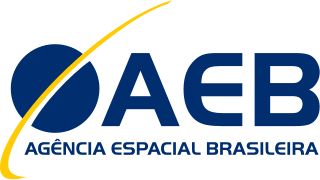
The Brazilian Space Agency is the civilian authority in Brazil responsible for the country's space program. It operates a spaceport at Alcântara, and a rocket launch site at Barreira do Inferno. It is the largest and most prominent space agency in Latin America.

The Canadian Space Agency is the national space agency of Canada, established in 1990 by the Canadian Space Agency Act.
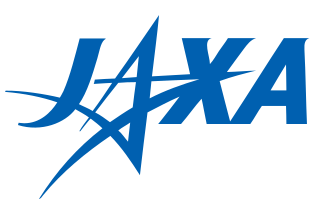
The Japan Aerospace Exploration Agency (JAXA) is the Japanese national air and space agency. Through the merger of three previously independent organizations, JAXA was formed on 1 October 2003. JAXA is responsible for research, technology development and launch of satellites into orbit, and is involved in many more advanced missions such as asteroid exploration and possible human exploration of the Moon. Its motto is One JAXA and its corporate slogan is Explore to Realize.
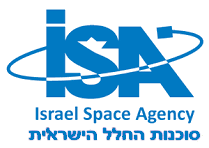
The Israel Space Agency is a governmental body, a part of Israel's Ministry of Science and Technology, that coordinates all Israeli space research programs with scientific and commercial goals.

The following outline is provided as an overview of and topical guide to space exploration.

A moonbase is a human outpost on or below the surface of the Moon. More than a mere site of activity or temporary camp, moonbases are extraterrestrial bases, supporting robotic or human activity, by providing surface infrastructure. Missions to the Moon have realized single-mission bases,, as well as some small permanent infrastructure like lunar laser ranging installations.

Greenhouse Gases Observing Satellite (GOSAT), also known as Ibuki, is an Earth observation satellite and the world's first satellite dedicated to greenhouse gas monitoring. It measures the densities of carbon dioxide and methane from 56,000 locations on the Earth's atmosphere. The GOSAT was developed by the Japan Aerospace Exploration Agency (JAXA) and launched on 23 January 2009, from the Tanegashima Space Center. Japan's Ministry of the Environment, and the National Institute for Environmental Studies (NIES) use the data to track gases causing the greenhouse effect, and share the data with NASA and other international scientific organizations.
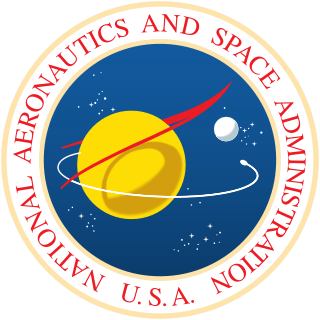
The National Aeronautics and Space Administration is an independent agency of the US federal government responsible for the civil space program, aeronautics research, and space research. Established in 1958, it succeeded the National Advisory Committee for Aeronautics (NACA) to give the US space development effort a distinct civilian orientation, emphasizing peaceful applications in space science. It has since led most of America's space exploration programs, including Project Mercury, Project Gemini, the 1968–1972 Apollo Moon landing missions, the Skylab space station, and the Space Shuttle. Currently, NASA supports the International Space Station (ISS) along with the Commercial Crew Program, and oversees the development of the Orion spacecraft and the Space Launch System for the lunar Artemis program.

Greenhouse gas monitoring is the direct measurement of greenhouse gas emissions and levels. There are several different methods of measuring carbon dioxide concentrations in the atmosphere, including infrared analyzing and manometry. Methane and nitrous oxide are measured by other instruments. Greenhouse gases are measured from space such as by the Orbiting Carbon Observatory and networks of ground stations such as the Integrated Carbon Observation System.

The South African National Space Agency (SANSA) is South Africa's government agency responsible for the promotion and development of aeronautics and aerospace space research. It fosters cooperation in space-related activities and research in space science, seeks to advance scientific engineering through human capital, as well as the peaceful use of outer space, and supports the creation of an environment conducive to the industrial development of space technologies within the framework of national government.
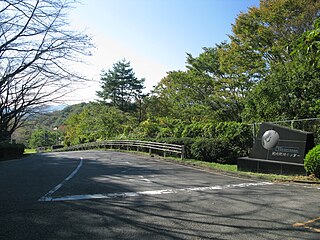
The Earth Observation Center is a Japanese Aerospace Exploration Agency (JAXA) aeronautical research facility located in Hatoyama, Saitama, Japan. It utilizes remote sensing technologies such as satellites to study Earth's environment from outer space. The research done by this center has a substantial impact on the study of the Earth's environmental phenomena, such as global warming.
The (Japanese) Lunar Exploration Program is a program of robotic and human missions to the Moon undertaken by the Japanese Aerospace Exploration Agency (JAXA) and its division, the Institute of Space and Astronautical Science (ISAS). It is also one of the three major enterprises of the JAXA Space Exploration Center (JSPEC). The main goal of the program is "to elucidate the origin and evolution of the Moon and utilize the Moon in the future".
The Ghana Space Science and Technology Institute (GSSTI) was opened officially on 2 May 2012 as Ghana’s first space science, space exploration, astronomy and technology space agency. It is an Institution under the Ghana Atomic Energy Commission. GSSTI and Ghana Space Agency (GhSA) aim to become an arena of excellence in space science, space exploration and space technology through teaching, learning, private spaceflight and space research commercialisation. The centre and space agency will also allow scientists and astronauts to conduct research into astrophysics, remote sensing, natural resource management, weather forecasting, agriculture and national security.

The Polish Space Agency is the space agency of Poland, administered by the Ministry of Economic Development and Technology. It is a member of the European Space Agency. The agency is focused on developing satellite networks and space technologies in Poland. It was established on 26 September 2014, and its headquarters are located in Gdańsk, Poland.

The New Zealand Space Agency is an agency within the New Zealand Ministry of Business, Innovation and Employment (MBIE) charged with "space policy, regulation and business development" relating to space activities in New Zealand.
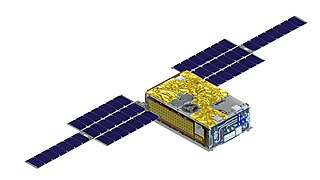
EQUULEUS is a nanosatellite of the 6U CubeSat format that will measure the distribution of plasma that surrounds the Earth (plasmasphere) to help scientists understand the radiation environment in that region. It will also demonstrate low-thrust trajectory control techniques, such as multiple lunar flybys, within the Earth-Moon region using water steam as propellant. The spacecraft was designed and developed jointly by the Japan Aerospace Exploration Agency (JAXA) and the University of Tokyo.
ArmCosmos, commonly known as the Armenian Space Agency, is an Armenian private agency responsible for the development of Armenia's commercial space industry, coordinating domestic activities, identifying opportunities and facilitating international space engagement, on behalf of the Government of Armenia. Its headquarters are located in Yerevan, Armenia.

The Artemis Accords are a series of non-binding multilateral arrangements between the United States government and other world governments that elaborates on the norms expected to be followed in outer space. The Accords are related to the Artemis program, an American-led effort to return humans to the Moon by 2026, with the ultimate goal of expanding space exploration to Mars and beyond.
The Luxembourg Space Agency (LSA) is the national space agency of the Grand Duchy of Luxembourg. It was founded on September 12, 2018, by Luxembourg's Economy Minister Étienne Schneider.
The history of space in Africa is the history of space activity by or sent from Africa.
References
- ↑ LAW N° 022/2021 of 18/04/2021 (Rwanda)
- ↑ Sabiiti, Daniel (2021-03-09). "Parliament Approves Law establishing Rwanda Space Agency". KT PRESS. Retrieved 2024-06-15.
- ↑ Staff (2020-05-28). "Big dream: inside Rwanda's newly established Space Agency". FurtherAfrica. Retrieved 2024-06-15.
- ↑ Ashimwe, Edwin (2021-10-24). "Inside Rwanda's space ambitions". The New Times. Retrieved 2024-06-15.
- ↑ "NASA Welcomes Nigeria, Rwanda as Newest Artemis Accords Signatories - NASA". 2022-12-13. Retrieved 2024-06-15.
- ↑ "UN Rwanda, Rwanda Space Agency to partner up on space activities | United Nations in Rwanda". rwanda.un.org. Retrieved 2024-06-15.
- ↑ admin (2023-11-01). "Rwanda Space Agency: Creating opportunity for emerging space economy - Space Watch Africa". Space Watch Africa. Retrieved 2024-06-15.
- ↑ "RSA takes Charge of the Rwanda Climate Observatory Project – Space in Africa" . Retrieved 2024-06-15.